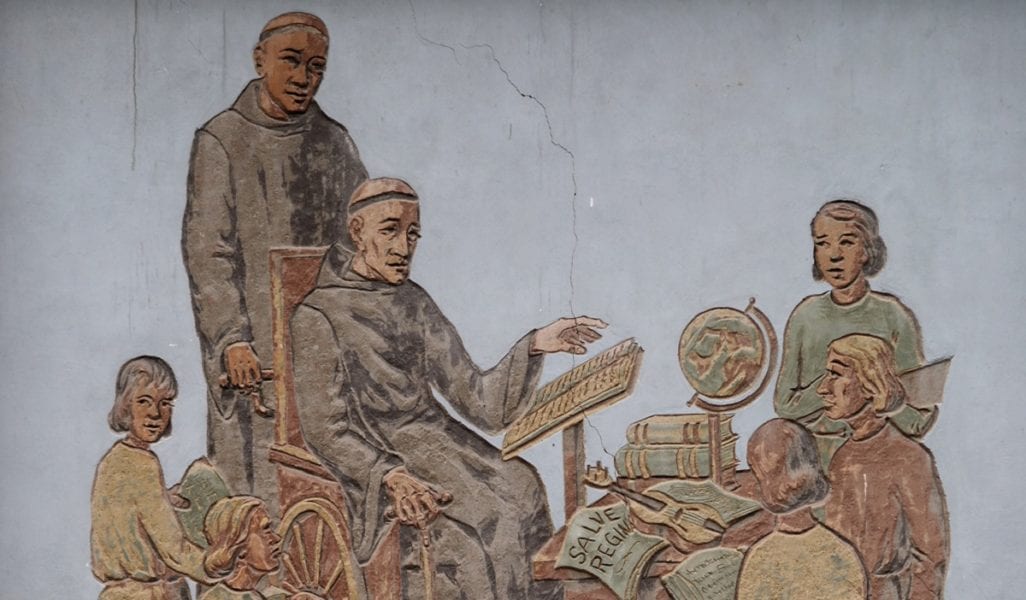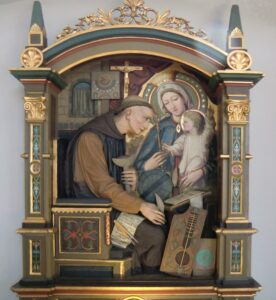
Blessed Hermann of Reichenau was an esteemed scientist and abbot, as well as a profoundly disabled man. Hermann was born in 1013 to Count Wolverad II von Althausen and his wife Hiltrud. Althausen was located in the Swabian region of southern Germany. Hermann was born with multiple anomalies, likely including cleft palate, cerebral palsy, and spina bifida. The child was unable to move about on his own and had to be carried, but he was blessed with a sharp intellect. Despite his handicaps, he clearly possessed some remarkable gifts, including explaining to his parents the meaning of the Latin Mass prayers. When he was seven, his parents brought him to the five-mile long island of Reichenau in nearby Lake Constance. Located there was the Benedictine monastery, founded in the eighth century, which was the center of literature and the arts for the region.
A REALIZATION OF HIS POTENTIAL
The couple met with the Abbot, Berno, who was amazed at the boy’s aptitude in mathematics. Berno invited young Hermann to live at the monastery and attend the cloister school, and he enthusiastically accepted. The boy thrived in the rich academic environment, and Abbot Berno was his primary teacher. This monastery was at its greatest eminence under Berno, and it contained a vast library for its monks and students. It was also a place where precious manuscripts were painstakingly copied, centuries before the invention of the printing press. Hermann lived his life confined to a specially adapted chair, carried from place to place by assistants. Despite struggling with speech and writing impediments, he nevertheless was able to master a long list of subjects, including four languages, theology, mathematics, history, and astronomy. He had a particular aptitude for music and poetry. Not surprisingly, he often prayed for the Virgin Mary’s intercession that he be restored to good health. At some point he experienced a Marian apparition, wherein she offered him the choice between good health and wisdom. He chose wisdom.

A BRILLIANT TEACHER
In 1043, Hermann entered the monastery as a monk, and continued his work as a researcher and teacher of numerous subjects in addition to living the structured daily life characteristic of the Benedictines. Scholars came from great distances to learn from him, with his skill as a polyglot enabling many to understand him. He designed and built numerous musical instruments and was one of the earliest composers of Gregorian Chant, which music theory he had learned from his mentor, Berno. After much research, he wrote an essay on the effect of music on the human body and psyche, and wrote extensively about the eight modes of music. Because one of the languages he knew was Arabic, he was able to provide and use the considerable body of knowledge of astronomy and mathematics previously only available in Arabic, which he translated into Latin. He theorized that the earth was round, and taught how to measure its circumference. He made three important inventions: an improved astrolabe (a complicated device for use in astronomy) an improved pillar sundial, and a quadrant with a cursor for mapping the sky. He also wrote a comprehensive history of the known world from the time of Christ’s birth, which he scrutinized for accuracy. This chronicle provided information about the 11th century that we have from no other source. There was a monastery of women at Buchau to whom he was particularly solicitous, and they requested his guidance. He wrote them a poem, multiple books long and peppered with humor, about the seven deadly sins and the ways of the world. When his treasured mentor, Berno, died in 1048, his fellow monks chose Hermann as their abbot. It was not only for his brilliance that many people were attracted to him, but also his holiness. He bore his infirmities without complaint and possessed a delightful sense of humor.
BEAUTIFUL LEGACY

Blind in his last few years, Hermann died September 24, 1054 at age forty. At his request, he was buried next to his mother at Althausen. Among his musical compositions, we have been left with his masterpiece, the Salve Regina (Hail Holy Queen). It was upon hearing this magnificent chant at Spire on Christmas Eve in 1146, that [St.] Bernard of Clairvaux, overcome with emotion, added “O clemens! O pia! O dulcis Virgo Maria!” (O clement, o loving, o sweet Virgin Mary), which became a permanent addition to Hermann’s composition. In our time when children considered “imperfect” are believed to have lives not worth living, the life of Hermann stands as a testimony that we cannot measure the value of a single human life. Within his deformed body lived a man of great humility, courage, patience, and charity, in addition to his obvious brilliance. Blessed Hermann was beatified in 1863. Also known as Bl. Hermann the Cripple or the Latinized version, Hermanus Contractus, his feast day is September 25.
